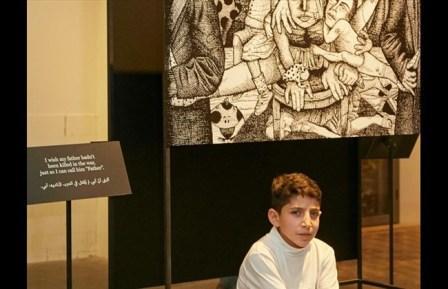
“Haneen,” Beit Beirut’s latest exhibition, unites the poetry of Syrian refugee children and the work they have inspired artists to make. Staged by UNICEF in partnership with Beyond Association – an NGO that promotes social and educational issues among children and marginalized communities – the show comprises 39 poems interpreted by 47 Lebanese and Syrian artists.
Its goal is to highlight the impact of war on children. The works range from paintings and drawings to sound installations and sculptures.
The exhibition stems from an aid initiative that began in 2013, when Beyond ran 107 education and aid centers for over 20,000 children in tented settlements around the country. One of the programs offered with UNICEF was Press Club, a series of writing workshops held until 2016.
“Many of these children didn’t know if they could write or not so our first objective was to teach them how to read and write. The second was to give them a space to express,” Beyond General Director Joseph Awad said during a news conference. “Then we built their capacity and language and now they’re writing.”
The poems and stories presented in the Beit Beirut show represent a small selection out of the thousands from children of various tented settlements who took part in the initiative. The show’s title, “Haneen” (a longing for something lost), is reflected in their words.
“When you read the poems it’s striking that some have the element of hope and the children are resilient,” UNICEF Project Coordinator Soha Bsat Boustani said. “They hope of going back to Syria, to their homes or schools and gardens. Some poems are very dark because they’ve lived things no child should live.
“They’ve seen their family die, houses destroyed and some of the children you see today are not the same as they once were,” she explained. “Some of them were not able to talk due to their psychological problems and with music and writing they improved.”
The children ranged from 10 to 14 years old when they wrote the tales. Ali Harba, now 12 years old and from a tented settlement in Omariyyeh, Bekaa, wrote about the death of his abusive father and his conflicted emotions about him.
“I wrote this story when my dad died and about how I want him to come back and how he died,” Habra told The Daily Star.
“I wished he would come back no matter what, even if he came back to hurt or kill me.”
Each art piece is paired with a short excerpt from the corresponding poem or story. Sandra Ghosn’s visualization of Harba’s “My Father’s Abuse” is a dark and convoluted illustration, overcrowded with emotive faces.
“I really liked it and it shows what I was trying to say really well,” Harba said of Ghosn’s work. “You can’t have the poem without the picture.”
Despite the trauma he endured during the war and since, he is hopeful about the future and wishes to one day become a war correspondent.
“I want to keep writing and getting all my inner feeling out,” he said. “Me and the other kids started learning how to write about all the things happening in the camp and about raising awareness of child labor, child marriages and anything we lived through.”
Exhibition curator Chadi Aoun said he contacted artists from all over the world and gave them a choice of three or four poems, based on what he thought would fit their style. They were given full artistic freedom, with the stipulation that they be loyal to the children’s poems and work with them on the representations.
Taghreed Ezzedine’s poem “Peace in Sign Language” inspired Syrian artist Karim Qabrawi to paint a star constellation in the shape of Ezzedine’s father, standing behind her as she smiles contentedly.
“She [Ezzedine] talked about her father and his disability [being deaf], and he taught her how to use sign language so the concept is all about signs,” Qabrawi told The Daily Star.
“She says at the end of her story she wished everyone had this disability and would use sign language. No one would be able to talk or hear and there would be no war and peace everywhere.
“When I searched sign language,” he added, “I found this sign which means ‘help.’ I put it on the T-shirt [of the girl in the painting] because she is disabled in a [metaphorical] way and her father behind her supports her, but we don’t know if he’s alive or not.”
While some viewers wondered if selling the pieces to raise money would benefit the children, Boustani said that the exhibition had a more important purpose.
“We want this show to go to several countries and the purpose of it is not to sell. It’s to raise awareness about a problem that is going into its eighth year,” Boustani explained.
“We want people and activists to talk about it and voice the concerns of children in Syria.
“There is media and sponsor fatigue but the problem continues in so many parts of the Arab world,” she added, “so for us the message is more important than raising money.”
Once the Beirut show concludes, the organizers intend to show it at UNICEF offices around the world.
“Haneen” is up at Beit Beirut, Sodeco, until March 4, 11 a.m. to 6 p.m.
Source: The Daily Star
 FR
FR EN
EN AR
AR








